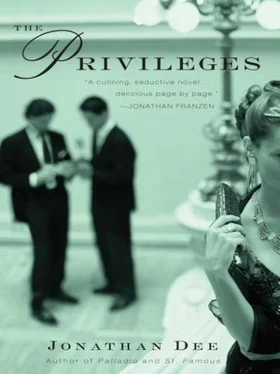“Ladies and gentlemen,” Agnew said, “this is Martin Strauss. Martin lives on the South Side with his parents, and he comes here every day unless it’s raining.”
Strauss stopped drawing, but not at the mention of his name. He looked at the pad in front of him for no more than a second or two, tore the page off from the spiral binding, lifted the rock, put the page face down on top of the pile, and placed the rock on top again.
“Though Martin has no particular notion of privacy,” Agnew said, “I will honor his privacy by not discussing the specific ways in which he has been diagnosed by society as outside its norms. As a human being, we have marginalized him, but as an artist, he has no sense of himself as an outsider, or an insider for that matter, because he has no sense of what these categories mean. He has no sense of an audience at all, critical or otherwise. He simply needs to express something. Compulsion without ambition. Not only can this not be faked, it cannot be willed either. He could not stop what he is doing, or change it, or tailor it to someone else’s expectations, if he wanted to. If you are enticed by the Art Brut ideal, you have to be willing to follow it where it takes you. This is not as simple as it may sound.”
By now Jonas had made his way to the front of the pack and could see the sketches, which someone — Strauss’s mother? — had stuck in cardboard matte frames and wrapped in cellophane to protect them from the elements, that were pinned to an easel behind Strauss’s card table. They were fantastically detailed black-and-white cityscapes, but the city was not Chicago. Every inch of every sheet was filled. The details, particularly the repetitive arcs of imaginary Art Deco-style masonry on the buildings, were so hypnotic that Jonas felt, before he figured out, what was missing from each picture as a whole: a sense of perspective. There was no shade or depth to it, no vanishing point of the sort even a grade-school art class would have taught him. But it wasn’t just some technique that Strauss didn’t know. It wasn’t a picture of something, Jonas realized with a kind of shiver. It was just a picture.
Raindrops started to fall. “Nikki?” Jonas heard Agnew say, and he looked up. “How much time?”
Nikki pushed up her many sleeves to look at her watch. “None,” she said.
“Okay then,” said Agnew, “take a good look, everyone, and then meet back at the bus, please, in five minutes.” Nearly everyone headed back to the bus immediately. Other than a haircut that looked as if maybe he had done it himself in front of a mirror, and a somewhat intimidating focus, nothing about Strauss appeared all that unusual. Jonas saw Agnew fishing for his wallet in his jacket pocket. He took out a twenty and put it in a shoebox full of pens that sat on the card table not far from Strauss’s elbow. Then he lifted the rock, took the entire sheaf of face-down drawings without looking at them, and headed back to the bus. Strauss didn’t even raise his head; he just kept working.
On the bus Jonas realized that since Nikki was a TA he must already have her campus email somewhere; when he got back to his apartment he found it on the syllabus and emailed her to ask her out. Almost twenty-four hours later — which meant either a certain reluctance to cross that boundary or just that she didn’t check her email that often — she wrote back yes. It didn’t take too long before someone spotted them having lunch together somewhere, and then it was all over campus like wildfire. Undergrads who dated TAs were like rock stars, at least if the TA was as beautiful as Nikki was. It made things awkward for her in Agnew’s class, all those bold eyes on her, but by then the semester was nearly over anyway.
As the spring wound down, and the coffee shops and libraries emptied, and station wagons full of sagging boxes and laundry bags started crawling around campus, Jonas, who was falling in love a little with Nikki, or at least thought he might be, found himself resisting the idea of going back to New York that summer at all. For what? Everyone he knew would be somewhere else anyway, and if he went out to Amagansett instead, where he’d find a decent sampling of them, there was nothing there but decadence and narcissism, drugs and money and entitlement and waiting petulantly for the night. Worst of all was when people like his mother referred to it as “the country,” as in, “We can’t see you Friday night, we’re driving out to the country.” It wasn’t the fucking country. It was a game preserve for rich people. But no one would acknowledge that: they all wanted to talk about this great farm stand they’d found, or how the guy who fixed their gutters came from an old whaling family. As for his parents, Jonas had nothing against seeing them, but the reality was that he probably wouldn’t see them that much anyway: ever since they’d set up the foundation, the seam between the business day and the rest of their time had become pretty much undetectable. Evenings and weekends were always taken up with some kind of dinner or fund-raiser or ribbon cutting or whatever. Which, you know, bully for them. He just didn’t want it to turn into another summer where he watched movies all day. That was for kids; and now he had a kind of life within his reach that promised something more adult and substantial, while his peers were still mired in the habits of adolescence, mastering video games and illegally downloading movies and trying to figure out where drunk women were likely to congregate.
What he would really have liked, actually, was to keep studying. One of the things he envied about Nikki was that while he was still fulfilling various diploma requirements, she had worked hard to narrow her interests down to the point where she got to spend her whole day thinking about one thing. She’d have her master’s by the end of the upcoming year, and she was already gathering herself, psychologically at least, for the big push of her doctoral thesis, which would be about Donald Judd. During evenings spent in restaurants — nicer ones, now that school was out and Nikki was less uptight about being seen and he was more eager to impress her — Jonas learned more about boxes than he ever would have thought possible. It could get pretty rarefied, to the point of absurdity sometimes, but that only made it more admirable, like she was some sort of nun with no choice but to accept her own estrangement from the world. Also he knew that her excitement — about the art, about her work on it, about the future that work might bring — would generalize into an excitement that she would want to work off sexually once they got back home. When she really got going she would start telling him what to do to her, which aroused him almost past the point where he could stand it. He didn’t know it was possible to feel so well suited to another person, no matter how odd a match they might have looked like to others. The future, as his dad liked to say, was now.
Nikki had a research fellowship with Agnew that defrayed the cost of her tuition, and the terms of that fellowship, which were basically those of Agnew’s cheerfully expressed but iron whims, were what kept her in Chicago over the summer. Her lease, though, like a lot of student leases, ran only through June. One morning at his place Jonas inexpertly scrambled some eggs and, as he watched her eat them in the summertime light with his bedsheet wrapped around her shoulders, he suggested, a little less blithely than he meant to, that she should move in with him.
He tried to hold on to this feeling of precocious maturity when his mother took the news that he wasn’t coming home that summer rather harder than he’d expected. She even sounded like she might have been crying a little bit. Jonas wound up agreeing to let her send the jet for him so he could at least spend a week at home. It was a little jarring to be reminded how much bigger the townhouse was than the apartment where he and Nikki now chose to live. He said he was tired of going out so he and his mother sat at the dining room table and the cook, whom Jonas hadn’t met before, brought them skate in a kind of clam broth that was probably the best meal he’d had in a year. “Home cooking,” he said, and Cynthia laughed. There was something different about her appearance. At first he thought maybe she’d had some work done, but it wasn’t anything as radical as that. Probably just Botox or whatever was the equivalent du jour. He didn’t know why she thought she needed it, but he didn’t say so. She liked to say that he could talk about anything with her, but it was an expression of his love for her that he would treat a subject like growing older as off-limits. She had a lot of questions for him about Nikki, which Jonas did his best to answer without answering.
Читать дальше












